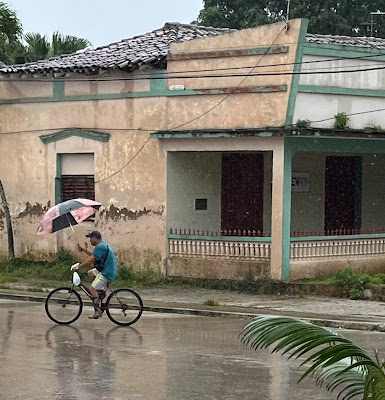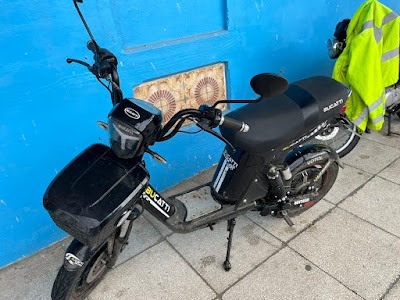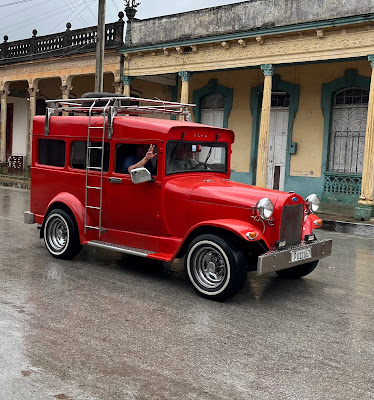Many people are familiar with the fact that many classic US cars from the 1950's still drive the roads in Cuba, but I wasn't quite prepared for all of the different modes of transport that share the roads there.
We we arrived at the camp from the airport, we were on an old school bus. The windows were darkly tinted and all of them were down. This made the bottom part so dark I couldn't see out the windows at all. The tops were open, but were right at my eye level, so I basically saw roofs and tree tops as we drove to the camp (disappointing for a first view, but I figure I had a week to see more).
The first evening I sat on a bench near the entrance to the camp and watched horse drawn buggies/wagons (think light weight trap), cars and scooters whiz by. The scooters were mostly electric and very quiet. The horse carts were loud (clipety clop). I think the old gas motorcycles were the loudest. On the second day, I stood out by the camp fence along the road and just snapped pictures for about five minutes.
There were some more modern cars on the road, but not many.
There was some discussion about whether the Presbytery should try to acquire some newer vehicles for the traveling pastors, but a brand new car with lots of computer chips would be impossible for them to fix without access to new parts.
Nearly every truck was some kind of hybrid contraption that was rigged together for who knows what purposes. They often had people riding along in the back since there was no real public transport to get people around.
Scooters were loaded up well with either two people or side saddles.
Some of these reminded me of the Griswold RV in Christmas vacation.
I was surprised by the degree of courtesy on the road with so many different vehicles. Many moved quite slow, but if you needed to pass someone, you did not race up behind them and ride their bumper, you just slowed down until it was open to pass and "toot tooted" your horn to let them know you were coming around. The horses apparently were well used to being on the road with cars and trucks. They didn't seem startled at all. I did note that they all wore side blinders, which probably helped a little.
I wish I had taken more pictures of the horse drawn carts. This was in the town of Placetas and they were everywhere. Apparently they serve as taxis as well as personal transportation. Some had 'poop catchers' and some did not. I don't know if there was a law about this or not. There was not too much horse droppings on the roads, but there was some.
Seeing horses just tied up to the side of the road was pretty common. The grasses along the roads were cropped (not mowed). The horses did not look like they were in amazing shape. You could see the ribs on almost all of them.
This little old lady was the only person I saw not wearing a helmet on a scooter. It was the law, but I guess she wasn't fussed about it.
I saw a number of people riding bikes with umbrellas. This would be pointless in Kansas with the wind, but maybe helped a little here. I could definitely not manage this feat.
Trucks came in every size and shape.
There were quite a few of these three wheeled scooters in town. I'm not sure if they had the capacity to travel much beyond town.
Many of the scooters were electric. I never got the chance to ask about the cost of utilities. I don't know if electricity was expensive or not. It was not my impression that people were trying to conserve energy, but they also didn't have a lot of energy hogging appliances, etc.
After the era of big American cars (1950s), then came the era of Soviet cars (up till the collapse of the Soviet Union in 1991).
This guy saw me taking a picture and waved.
We were told that there was no real threat to our physical safety (violent crimes are rare), but apparently theft is not uncommon at all. Our host parked this old Lada in the church courtyard and locked the gate at night. The gate to the camp was also closed in the evening.



























No comments:
Post a Comment